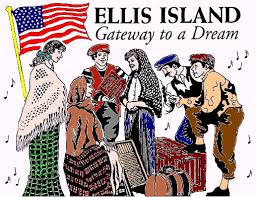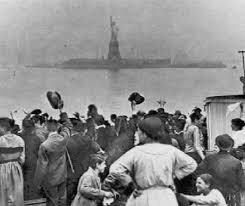We often forget, or need to reminded, how much political decisions impact each of our lives on a daily basis. Particularly during Presidential campaigns, when key issues are debated endlessly, it's a good time to reflect on how these decisions ripple through our lives.
On both sides of my family, my maternal Grandfather and paternal Grandfather came to America from Western Europe in the early 1900's. While I have attended a few family reunions, I unfortunately don't remember much of either (they both passed away when I was just a child). However, my parents have shared memories with me of this incredible journey.
I would like to use this narrative for a look back, on my Grandparents and the millions of others who bravely came to America during that era, when immigration was not an issue, and most people were welcome at American borders.
In his book, A Nation of Immigrants, John F. Kennedy writes,
“There were probably as many reasons for coming to America as there were people who came. It was a highly individual decision.”Historians agree that three social forces were the chief motivators for the mass migration to America: religious persecution, political oppression and economic hardship. It is, however, almost impossible to relate such a combination of overwhelming circumstances to the experience of one immigrant, or even of one family.
Although more than 12 million people passed through Ellis Island on their way to the promise of a better life in America, they walked through its gates one at a time, individual by individual.
Ellis Island opened in 1892 as a federal immigration station, a purpose it served for more than 60 years (it closed in 1954). Millions of newly arrived immigrants passed through the station during that time–in fact, it has been estimated that close to 40 percent of all current U.S. citizens can trace at least one of their ancestors to Ellis Island.
After an arduous sea voyage, many passengers described their first glimpse of New Jersey, while third-class or steerage passengers lugged their possessions onto barges that would take them to Ellis Island. Immigrants were tagged with information from the ship’s registry and passed through long lines for medical and legal inspections to determine if they were fit for entry into the United States. From 1900 to 1914–the peak years of Ellis Island’s operation–some 5,000 to 10,000 people passed through the immigration station every day. Approximately 80 percent successfully passed through in a matter of hours, but others could be detained for days or weeks. Many immigrants remained in New York , while others traveled by barge to railroad stations in Hoboken or Jersey City, New Jersey, on their way to destinations across the country.

Passage of the Immigrant Quota Act of 1921 and the National Origins Act of 1924, which limited the number and nationality of immigrants allowed into the United States, effectively ended the era of mass immigration into New York. From 1925 to its closing in 1954, only 2.3 million immigrants passed through Ellis Island–which was still more than half of all those entering the United States.
Steerage was enormously profitable for steamship companies. Even though the average cost of a ticket was only $30, larger ships could hold from 1,500 to 2,000 immigrants, netting a profit of $45,000 to $60,000 for a single, one-way voyage. The cost to feed a single immigrant was only about 60 cents a day!
For most immigrants, especially early arrivals, the experience of steerage was like a nightmare (at one time, the average passenger mortality rate was 10 percent per voyage). The conditions were so crowded, so dismally dark, so unsanitary and so foul-smelling, that they were the single most important cause of America’s early immigration laws. Unfortunately, the laws were almost impossible to enforce and steerage conditions remained deplorable, almost beyond belief. As late as 1911, in a report to President William H. Taft, the United States Immigration Commission said:
In spite of the miserable conditions, the immigrants had faith in the future. To pass the time—a crossing could take anywhere from a week to more than a month, depending on the ship and weather—they would play cards, sing, dance and talk... talk... talk...

Rumors about life in America, combined with stories about rejections and deportations at Ellis Island, circulated endlessly. There were rehearsals for answering the immigration inspectors’ questions and hour upon hour was spent learning the strange new language.
By the time the tiring trip approached its long-awaited end, most immigrants were in a state of shock: physically, mentally and emotionally. Yet, even with the shores of a new world looming before their eyes, and even with tears of relief streaming down their faces, their journey was not at an end.

I was told my paternal Grandmother landed in America with $4.00 in her pocket. She was on the ship for over 3 weeks, alone, and of course frightened. Yet She persevered, and lived in NYC for the rest of her life, marrying and having 3children, and 10 grandchildren. Although She didn't live long enough to see us grow, I am so thankful for her bravery and kindness.
This is not a political statement, but I ask each of you to think of where most of would be if not for the immigration policy of America during that time.
After an arduous sea voyage, many passengers described their first glimpse of New Jersey, while third-class or steerage passengers lugged their possessions onto barges that would take them to Ellis Island. Immigrants were tagged with information from the ship’s registry and passed through long lines for medical and legal inspections to determine if they were fit for entry into the United States. From 1900 to 1914–the peak years of Ellis Island’s operation–some 5,000 to 10,000 people passed through the immigration station every day. Approximately 80 percent successfully passed through in a matter of hours, but others could be detained for days or weeks. Many immigrants remained in New York , while others traveled by barge to railroad stations in Hoboken or Jersey City, New Jersey, on their way to destinations across the country.
Passage of the Immigrant Quota Act of 1921 and the National Origins Act of 1924, which limited the number and nationality of immigrants allowed into the United States, effectively ended the era of mass immigration into New York. From 1925 to its closing in 1954, only 2.3 million immigrants passed through Ellis Island–which was still more than half of all those entering the United States.
Steerage was enormously profitable for steamship companies. Even though the average cost of a ticket was only $30, larger ships could hold from 1,500 to 2,000 immigrants, netting a profit of $45,000 to $60,000 for a single, one-way voyage. The cost to feed a single immigrant was only about 60 cents a day!
For most immigrants, especially early arrivals, the experience of steerage was like a nightmare (at one time, the average passenger mortality rate was 10 percent per voyage). The conditions were so crowded, so dismally dark, so unsanitary and so foul-smelling, that they were the single most important cause of America’s early immigration laws. Unfortunately, the laws were almost impossible to enforce and steerage conditions remained deplorable, almost beyond belief. As late as 1911, in a report to President William H. Taft, the United States Immigration Commission said:
“The open deck space reserved for steerage passengers is usually very limited, and situated in the worst part of the ship, subject to the most violent motion, to the dirt from the stacks and the odors from the hold and galleys... the only provisions for eating are frequently shelves or benches along the sides or in the passages of sleeping compartments. Dining rooms are rare and, if found, are often shared with berths installed along the walls. Toilets and washrooms are completely inadequate; saltwater only is available."
“The ventilation is almost always inadequate, and the air soon becomes foul. The unattended vomit of the seasick, the odors of not too clean bodies, the reek of food and the awful stench of the nearby toilet rooms make the atmosphere of the steerage such that it is a marvel that human flesh can endure it... Most immigrants lie in their berths for most of the voyage, in a stupor caused by the foul air. The food often repels them... It is almost impossible to keep personally clean. All of these conditions are naturally aggravated by the crowding.
In spite of the miserable conditions, the immigrants had faith in the future. To pass the time—a crossing could take anywhere from a week to more than a month, depending on the ship and weather—they would play cards, sing, dance and talk... talk... talk...
Rumors about life in America, combined with stories about rejections and deportations at Ellis Island, circulated endlessly. There were rehearsals for answering the immigration inspectors’ questions and hour upon hour was spent learning the strange new language.
By the time the tiring trip approached its long-awaited end, most immigrants were in a state of shock: physically, mentally and emotionally. Yet, even with the shores of a new world looming before their eyes, and even with tears of relief streaming down their faces, their journey was not at an end.
I was told my paternal Grandmother landed in America with $4.00 in her pocket. She was on the ship for over 3 weeks, alone, and of course frightened. Yet She persevered, and lived in NYC for the rest of her life, marrying and having 3children, and 10 grandchildren. Although She didn't live long enough to see us grow, I am so thankful for her bravery and kindness.
This is not a political statement, but I ask each of you to think of where most of would be if not for the immigration policy of America during that time.


